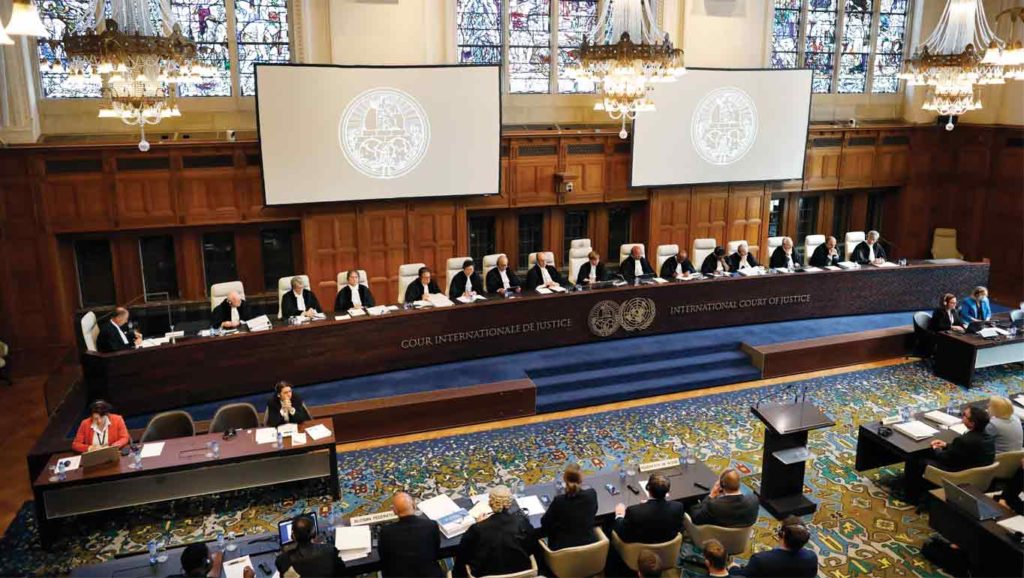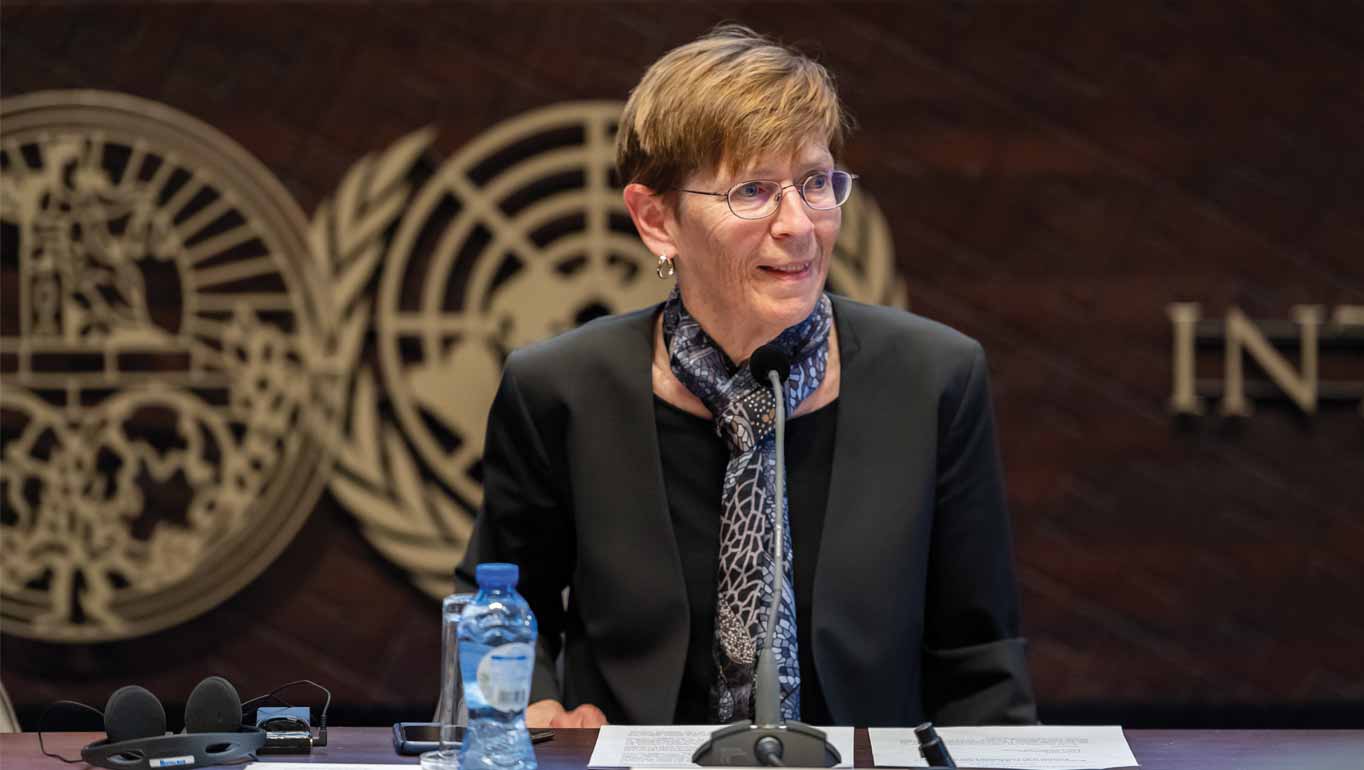You have been elected as a Judge at the International Court of Justice (ICJ) in 2010 and have been serving as its President since 2021. What were some of the challenges you encountered during your presidency?
The COVID-19 pandemic was undoubtedly one challenge that characterized the first half of my presidency. I was elected to serve as President in early February 2021, in the midst of this public health crisis. I recall that only a few days earlier, the Government of our Host Country, the Netherlands, had introduced a strict curfew as a means to curb the spread of a new variant.
Prior to my presidency, the Court had adapted its methods of work to ensure a continued focus on judicial matters during all stages of the pandemic, transitioning to hybrid hearings and meetings. With these measures in place, we were able to maintain the quality and pace of our judicial work, while respecting confidentiality and continuing to operate in the Court’s two official languages – English and French. I credit our success to the initiative of my predecessor, President Abdulqawi Yusuf, as well as the Registrar and his staff. As restrictions arising from the pandemic started to be lifted, the Court was able to return smoothly to in-person working methods with effect from 1 June 2022.
Another significant challenge with which the ICJ and its President have to grapple, relates to the pace of work required to keep up with the Court’s ever-growing docket. Just over the last two years – between July 2021 and July 2023 – the Court was seized of eleven new contentious and advisory cases. To contrast this with the situation when I joined the Court in September 2010: over the following two years, only three new cases were added to the Court’s docket.
While the Judges welcome the increased resort to the peaceful settlement of disputes before the ICJ, and are honoured by the trust placed in the Court by UN organs and Member States, I have a growing concern about the impact of this situation on the Court’s staff. As I have pointed out in my annual briefing to the General Assembly, the resources available to the Court’s Registry have not kept pace with the increase in the Court’s workload in recent years. Given the number and complexity of cases on our docket and the frequency with which the ICJ has recently been faced with time-sensitive incidental proceedings, it is only thanks to the incredibly hard work and dedication of its small Registry that the Court has been able to keep abreast of its casework. It will be necessary to find a more sustainable solution to this challenge, which is expected to continue in the coming years.
How important is the ICJ for the UN System?
Since the Court’s establishment in 1946, States have submitted 160 disputes to the ICJ, and almost 30 requests for advisory opinions on legal questions have been referred to it by UN organs and specialized agencies. These cases have arisen from all geopolitical regions of the world, and the ICJ has thus lived up to its moniker of “World Court”. A further achievement that should not be overlooked is the Court’s development, over the past 77 years, of a significant body of jurisprudence which deals with an ever-increasing variety of legal issues. A glance at the Court’s docket and its recent ‘Annual reports to the General Assembly’ makes clear that the Member States have been looking to the Court to address a variety of pressing concerns.
At the same time, the Court should not be overloaded with expectations for which it was not designed. We must heed the words of my colleague and friend, late Professor David Caron, who observed in 2017 that, in the absence of comprehensive and robust machinery for international governance, international courts are often “the only tool available; they are screwdrivers that have been asked not only to place screws but also to hammer nails”. He cautioned that, if courts are used excessively as hammers, they will cease to function well as screwdrivers.

Could you tell us about a case you worked on that you found interesting, and why?
In 2010, Australia brought a case against Japan claiming that the latter’s whaling program violated the International Convention for the Regulation of Whaling of 1946. Under the Convention, a moratorium was in place precluding, among other things, the taking of whales for commercial purposes, but State Parties could grant special permits authorizing their citizens “to kill, take and treat whales for purposes of scientific research”. Japan was operating a program of lethal whaling that it claimed fit within this exception. The Court reviewed Japan’s whaling programme in detail, taking into a consideration a range of technical and scientific evidence, and concluded that the special permits granted by Japan for the killing, taking and treating of whales in connection with that programme were not “for purposes of scientific research”, and thus violated the 1946 Convention. In its judgement, issued in 2014, the Court ordered Japan to revoke any extant licence and refrain from granting any further permits.
I call attention to this case because it illustrates the range of questions the Court is called to address. The ICJ is the principal judicial organ of the United Nations and, as such, is expected to answer complex questions of public international law in pronouncements that are not subject to appeal. But, unlike courts of last instance in many national legal systems that are charged only with answering questions of law, the ICJ is also a court of first instance. We are routinely asked to decide difficult questions of fact, sometimes requiring advice from expert appointed by the parties to a case or by the Court itself. In the whaling case, for instance, the ICJ’s judgement considered scientific evidence presented by the Parties’ experts.
Why did you decide to embark on a career in international law?
In the United States, students first obtain a bachelor’s degree in a subject other than law before attending law school, which is a graduate program. I became interested in law after writing my undergraduate thesis on an aspect of Soviet law. When I arrived at law school at the University of California, Berkeley, I had the privilege of studying international law with outstanding professors, including Stephan Riesenfeld and Richard Buxbaum. The more I learned from them, the more convinced I became that international law was the field for me. I followed their advice not to become overly specialized, which has been of great value to me. I took every available course relating to international law and comparative law and was fortunate eventually to find a position at the U.S. State Department, where I found that my education had equipped me to serve in a variety of positions.
Would you have any advice for young people, and particularly women, interested in pursuing a career in international law?
I would encourage students to take available international and comparative law courses and to seek out professors who will help them to think critically. I would particularly recommend courses that provide a solid grounding in the fundamental building blocks of international law and would caution them against over-specialising. International law is a notoriously competitive field, so academic performance is perhaps even more important than course selection.
As to the situation of women, in the mid-1980s, when I started my career as a lawyer at the US Department of State, I often looked around a meeting room and thought, “I’m the youngest person in the room and the only woman”. Several decades later, I am certainly no longer the youngest person in the meeting room, but it shocks me that I am still at times the only woman. Today, even though women are well-represented in law schools and junior legal positions, we continue to be wildly under-represented at senior levels in the field of international law. Regrettably, it remains the case that aspiring international lawyers who are women, as well as those coming from the global South, must be prepared to work harder than their peers to prove themselves and earn their place in international law.



